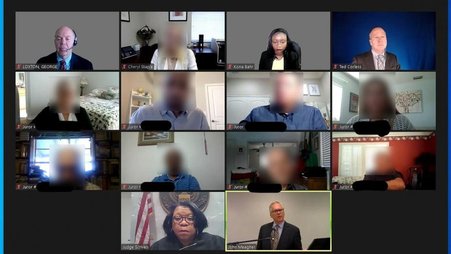Press coalition to courts: Don’t walk back pandemic-era access


CTK/Josef Horazny via AP
Our court system should be open to the public and not operate behind closed doors.
The First Amendment gives the public and the press the right to attend trials, access court documents, and report on the justice system. But far too often, judges try to evade that right by sealing records or holding secret proceedings.
We must fight back against attempts to make the court system less transparent and push to expand access. Reporting on the courts helps make our justice system fairer and guards against miscarriages of justice.

The Supreme Court will take the unprecedented step of broadcasting its oral arguments for two weeks beginning today, enacting in response to the coronavirus pandemic a measure that government transparency advocates have demanded for years.

Journalists covering state responses to the coronavirus pandemic are hampered as officials reduce seating in briefing rooms, introduce unreliable technology and, in some cases, refuse real-time questions.

Student journalists, plagued by questions of editorial independence and with varying degrees of First Amendment protections, nonetheless face the same press freedom challenges as their professional counterparts.The U.S. Press Freedom Tracker, which documents First Amendment aggressions in the United States, has collected student journalism-based incidents at both the university …

A recent federal appeals court ruling may be a big win for data journalists and researchers who depend on scraping to collect information to report on.

Recent courtroom wins in California have led to the release of new police shooting records under a new transparency law, but some government agencies have been resisting compliance.

A lawsuit by a logging company against environmental groups is a prime example of how corporations bring lawsuits in an attempt to drain their critics of resources and intimidate them into silence.

In a decision that could have dangerous reverberations for press freedom, a federal district judge ruled last week that Esquire violated a copyright held by a Deutsche Bank vice president when it published his photo of Donald Trump crashing a stranger’s wedding at his New Jersey club.

After the White House unilaterally revoked CNN White House correspondent Jim Acosta's press pass last week, a federal judge has temporarily ordered the White House to reinstate it immediately.

Many civil liberties violations and instances of state abuse that incarcerated people experience are rendered invisible from the rest of the country. Prisons are cracking down on incarcerated people’s rights to access information, learn, and read the news—a huge threat to the First and Fourth Amendments.

Law enforcement can no longer claim people have no right to privacy when using a cell phone, and must obtain a warrant to collect historical location data, the Supreme Court ruled today in the long-awaited Carpenter v. United States. This ruling marks a victory for the First and Fourth Amendments, and for journalism.